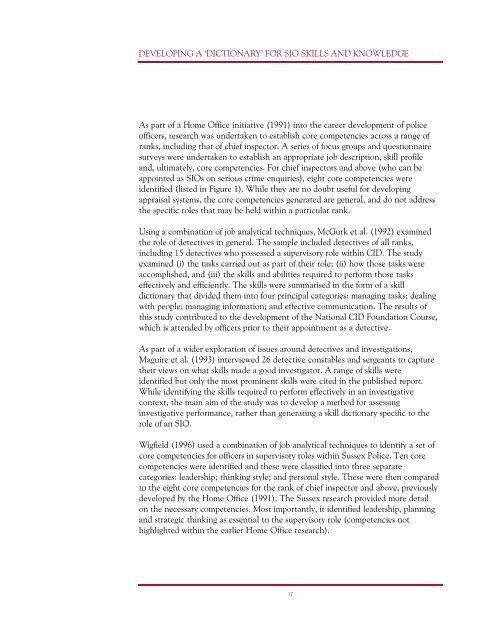Effective Detective
Effective Detective
Effective Detective
- No tags were found...
Create successful ePaper yourself
Turn your PDF publications into a flip-book with our unique Google optimized e-Paper software.
DEVELOPING A ‘DICTIONARY’ FOR SIO SKILLS AND KNOWLEDGEAs part of a Home Office initiative (1991) into the career development of policeofficers, research was undertaken to establish core competencies across a range ofranks, including that of chief inspector. A series of focus groups and questionnairesurveys were undertaken to establish an appropriate job description, skill profileand, ultimately, core competencies. For chief inspectors and above (who can beappointed as SIOs on serious crime enquiries), eight core competencies wereidentified (listed in Figure 1). While they are no doubt useful for developingappraisal systems, the core competencies generated are general, and do not addressthe specific roles that may be held within a particular rank.Using a combination of job analytical techniques, McGurk et al. (1992) examinedthe role of detectives in general. The sample included detectives of all ranks,including 15 detectives who possessed a supervisory role within CID. The studyexamined (i) the tasks carried out as part of their role; (ii) how those tasks wereaccomplished, and (iii) the skills and abilities required to perform those taskseffectively and efficiently. The skills were summarised in the form of a skilldictionary that divided them into four principal categories: managing tasks; dealingwith people; managing information; and effective communication. The results ofthis study contributed to the development of the National CID Foundation Course,which is attended by officers prior to their appointment as a detective.As part of a wider exploration of issues around detectives and investigations,Maguire et al. (1993) interviewed 26 detective constables and sergeants to capturetheir views on what skills made a good investigator. A range of skills wereidentified but only the most prominent skills were cited in the published report.While identifying the skills required to perform effectively in an investigativecontext, the main aim of the study was to develop a method for assessinginvestigative performance, rather than generating a skill dictionary specific to therole of an SIO.Wigfield (1996) used a combination of job analytical techniques to identify a set ofcore competencies for officers in supervisory roles within Sussex Police. Ten corecompetencies were identified and these were classified into three separatecategories: leadership; thinking style; and personal style. These were then comparedto the eight core competencies for the rank of chief inspector and above, previouslydeveloped by the Home Office (1991). The Sussex research provided more detailon the necessary competencies. Most importantly, it identified leadership, planningand strategic thinking as essential to the supervisory role (competencies nothighlighted within the earlier Home Office research).17


